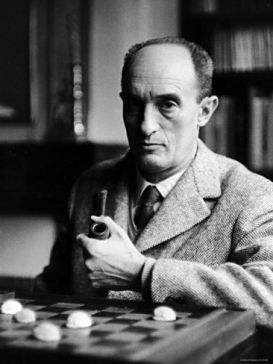
Pierre Boulle (1912-1994) was a French author who wrote several science fiction novels, including Planet of the Apes. Trained as an electrical engineer, Boulle spent eight years in Malaysia as a planter and soldier. His experience as a secret agent with the Free French in Singapore during World War II inspired his famous novel The Bridge on the River Kwai.
Read my overview of Boulle’s SFT here
Watch Boulle discuss Planet of the Apes (en français) [video]
Listed below are Boulle’s speculative texts that have been translated into English:
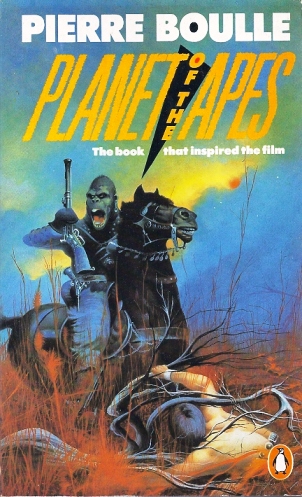
Planet of the Apes (La planete des singes), 1963
translated by Xan Fielding (Vanguard Press, 1963)
“In this simian world, civilization is turned upside down: apes are men and men are apes; apes rule and men run wild; apes think, speak, produce, wear clothes, and men are speechless, naked, exhibited at fairs, used for biological research. On the planet of the apes, man, having reached to apotheosis of his genius, has become inert. To this planet come a journalist and a scientist. The scientist is put into a zoo, the journalist into a laboratory. Only the journalist retains the spiritual strength and creative intelligence to try to save himself, to fight the appalling scourge, to remain a man.”
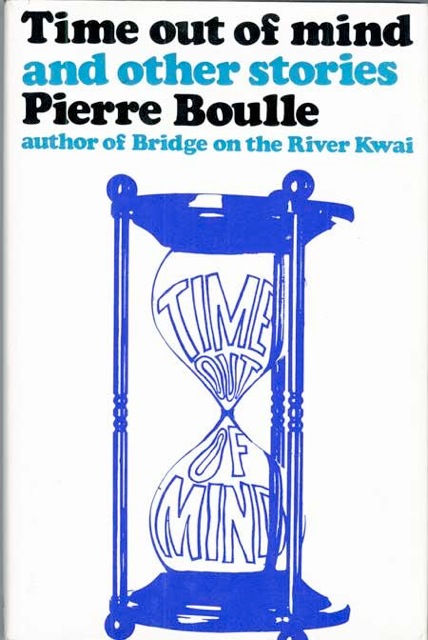
Time Out of Mind and Other Stories (Contes de l’absurde suivis de E=mc²), 1963
translated by Xan Fielding and Elisabeth Abbott (Vanguard Press, 1966)
“Time Out of Mind” (tr. of Une nuit interminable 1953)
“The Man Who Picked Up Pins” (tr. of L’homme qui ramassait les épingles 1965)
“The Miracle” (tr. of Le miracle 1957)
“The Perfect Robot” (tr. of Le parfait robot 1953)
“The Enigmatic Saint” (tr. of Le saint énigmatique 1965)
“The Lunians” (tr. of Les Luniens 1957)
“The Diabolical Weapon” (tr. of L’arme diabolique 1965)
“The Age of Wisdom” (tr. of Le règne des sages 1953)
“The Man Who Hated Machines” (tr. of L’homme qui haïssait les machines 1965)
“Love and Gravity” (tr. of L’amour et la pesanteur 1957)
“The Hallucination” (tr. of L’hallucination 1953)
“E=mc²” (tr. of E=mc² ou le roman d’une idée 1957)
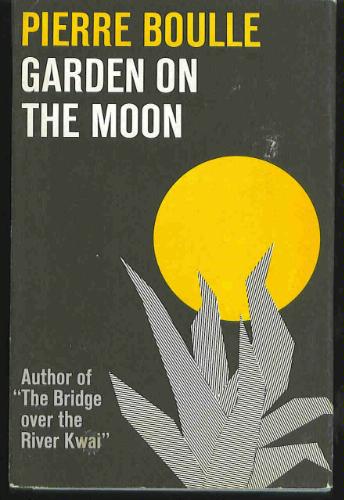
Garden on the Moon (Le jardin de Kanashima), 1964
translated by Xan Fielding (Vanguard Press, 1965)
“Hitler is dead. The German scientists have joined the victors. What started as inspired collaboration at Peenemunde turns into a fatal race as the brilliant ‘lunatics’ scatter across the earth to join up with the big powers in the desperate race to put the first man on the moon. Convention, morality and genius crumble when an inspired contender engineers the world’s greatest upset.”
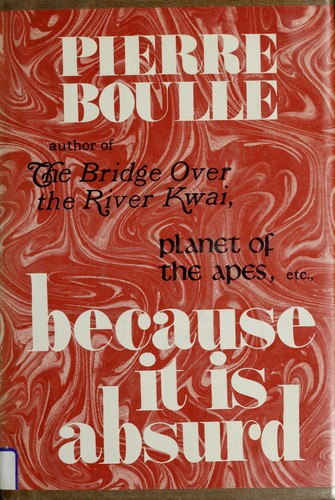 Because it is Absurd (on Earth as in Heaven) (Quia absurdum: sur la Terre comme au Ciel), 1966
Because it is Absurd (on Earth as in Heaven) (Quia absurdum: sur la Terre comme au Ciel), 1966
translated by Elisabeth Abbott (Vanguard Press, 1971)
“His Last Battle” (tr. of Son dernier combat 1970)
“The Plumber” (tr. of Le plombier 1970)
“Interferences” (tr. of Interférences 1970)
“The Duck Blind” (tr. of L’affût au canard 1970)
“When the Serpent Failed” (tr. of Quand le serpent échoua 1970)
“The Holy Places” (tr. of Les lieux saints 1970)
“The Heart and the Galaxy” (tr. of Le cœur et la galaxie 1970)
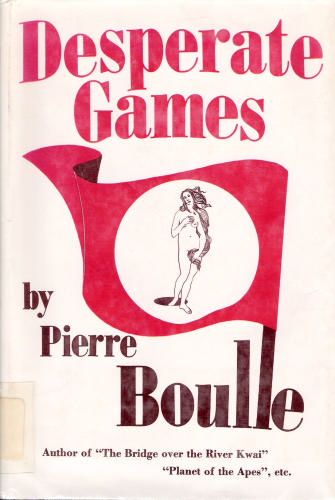 Desperate Games (Les jeux de l’esprit), 1971
Desperate Games (Les jeux de l’esprit), 1971
translated by Patricia Wolf (Vanguard Press, 1973)
“Despairing at the state of world degeneration, a group of the world’s most renowned intellectuals form the new Scientific World Government, aiming to put the world to rights. Elected into power, they quickly start making changes for the better, eliminating world hunger and cancer, encouraging scientific thought, and banning frivolous entertainment. But while congratulating themselves on a job well done, they fail to notice that actually, people are not happy. The suicide rate has sky-rocketed and, strangely, it turns out the public wants a little risk and conflict in their lives. So to cater to the masses, the Department of Psychology forms a plan: they will stage an entertainment show the likes of which the world has never seen before. It starts with gladiatorial style battles, bloodthirsty and brutal, where the victors become celebrities of unseen proportions, and quickly escalates into entire historical battle re-enactments involving chemical warfare and mass destruction. The Scientific World Government has unleashed a monster.”
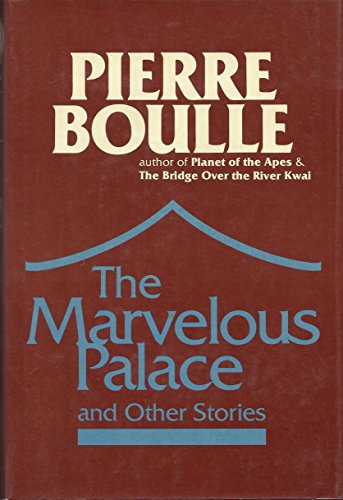 The Marvelous Palace and Other Stories (Histoires perfides), 1976
The Marvelous Palace and Other Stories (Histoires perfides), 1976
translated by Margaret Giovanelli (Vanguard Press, 1977)
“The Royal Pardon” (tr. of La grâce royale 1976)
“The Marvelous Palace” (tr. of Le palais merveilleux de la petite ville 1976)
“The Laws” (trans. of Les lois 1976)
“The Limits of Endurance” (trans. of Les limites de l’endurance 1976)
“Compassion Service” (tr. of Service compassion 1976)
“The Angelic Monsieur Edyh” (tr. of L’angélique monsieur Edyh 1976)
 The Good Leviathan (Le bon Léviathan), 1977
The Good Leviathan (Le bon Léviathan), 1977
translated by Margaret Giovanelli (Vanguard Press, 1979)
“A monster sails the seas, carrying the threat of atomic catastrophe on the one hand and of a potential oil slick in the other. This is how a group of worried ecologists perceives the nuclear powered giant oil tanker Gargantua, which they soon nickname Leviathan. But in the end,this evil creature comes out to be a double blessing : first because of the unexpected virtues of atomic desintagretion, and secondly because of the unpredictable carateristic of the slimy poison it holds in its side.”
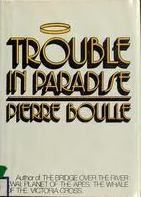 Trouble in Paradise (Les coulisses du ciel), 1979
Trouble in Paradise (Les coulisses du ciel), 1979
translated by Patricia Wolf (Vanguard Press, 1985)
Trouble in Paradise is not so much an exploration of a theological question (the nature of the Trinity) but instead an attempt at shifting perspective when it comes to humans and spiritual beliefs. Here, Boulle transforms the figures of God, Jesus, the Holy Spirit, Mary, and the angels into something akin to the bickering, resentful, and vengeful Greek gods. In other words, Boulle humanizes these figures and imagines how humankind might influence them, rather than the other way around.
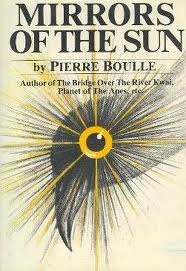 Mirrors of the Sun (Miroitements), 1982
Mirrors of the Sun (Miroitements), 1982
translated by Patricia Wolf (Vanguard Press, 1986)
“After Jean Blondeau, a pro-environmentalist, becomes President of France, he begins a project that will give his country’s entire population all of its necessary energy and eradicate pollution, but the venture soon becomes a nightmare.”
